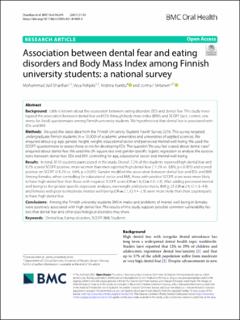| dc.description.abstract | Background
Little is known about the association between eating disorders (ED) and dental fear. This study investigated the association between dental fear and EDs through body mass index (BMI), and SCOFF (sick, control, one stone, fat, food) questionnaire among Finnish university students. We hypothesised that dental fear is associated with EDs and BMI.
Methods
We used the latest data from the Finnish University Student Health Survey 2016. This survey targeted undergraduate Finnish students (n = 10,000) of academic universities and universities of applied sciences. We enquired about e.g. age, gender, height, weight, educational sector and perceived mental well-being. We used the SCOFF questionnaire to assess those at risk for developing EDs. The question ‘Do you feel scared about dental care?’ enquired about dental fear. We used the chi-square test and gender-specific logistic regression to analyse the associations between dental fear, EDs and BMI controlling for age, educational sector and mental well-being.
Results
In total, 3110 students participated in the study. Overall 7.2% of the students reported high dental fear and 9.2% scored SCOFF positive; more women than men reported high dental fear (11.2% vs. 3.8%, p < 0.001) and scored positive on SCOFF (14.2% vs. 3.6%, p < 0.001). Gender modified the association between dental fear and EDs and BMI. Among females, when controlling for educational sector and BMI, those with positive SCOFF score were more likely to have high dental fear than those with negative SCOFF score (OR = 1.6; CI = 1.0–2.4). After adding perceived mental well-being to the gender-specific regression analyses, overweight and obese males, BMI ≥ 25 (OR = 2.4; CI 1.3–4.4) and females with poor to moderate mental well-being (OR = 2.1; CI 1.4–2.9) were more likely than their counterparts to have high dental fear.
Conclusions
Among the Finnish university students BMI in males and problems of mental well-being in females were positively associated with high dental fear. The results of this study support possible common vulnerability factors that dental fear and other psychological disorders may share. | en_US |

